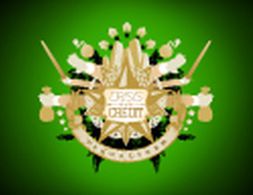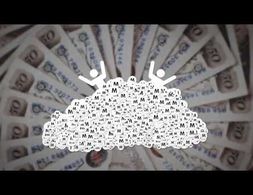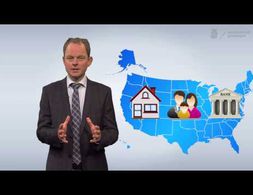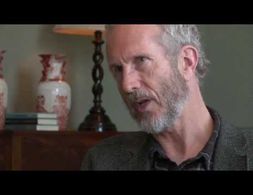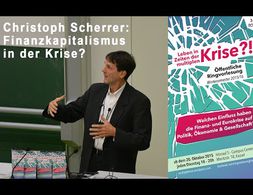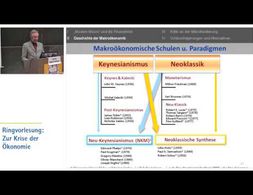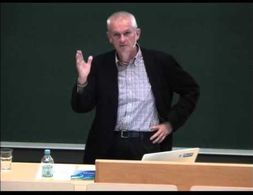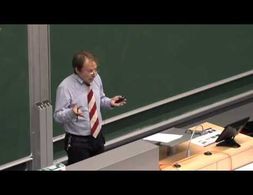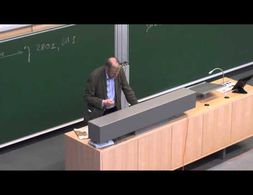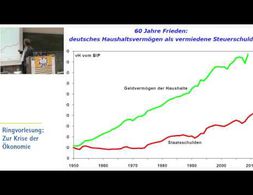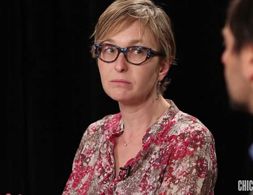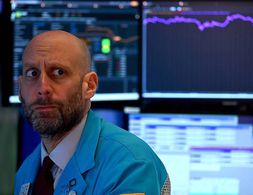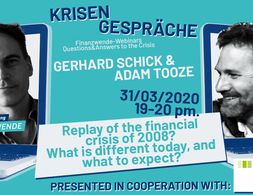72 Ergebnisse
The historical situation of low interest rates after the Fed's response to the 2001 crisis alongside with huge foreign money inflow to the US are presented as the historical context in which subprime lending and financial instruments like CDOs and CDS evolved. Then those instruments as well as the concept of leverage are explained briefly.
Renowned scholars elaborate a critique on neoclassical economics and how it was unable to predict and even favoured the financial crisis. They refer to DSGE models, equilibrium theory and rational agents – a brief insight in the critique on neoclassic economics.
Economist and 2020 Balzan Prize winner for Environmental Challenges: Responses from the Social Sciences and Humanities, Joan Martínez Alier, speaks on the importance of ecological economics and its timeliness around the 2007/2008 global financial crisis. He speaks on the importance of building the field of ecological economics “from the ground up” through praxis.
Geldpolitische Maßnahmen in Reaktion auf die Finanzkrise enthalten zum einen Gender-, Klassen- und ethnische Normen und haben zum anderen asymmetrische Auswirkungen auf verschiedene gesellschaftliche Gruppen. Sie benachteiligen, wie Brigitte Young zeigt, vor allem auch Frauen und deren ökonomische Situation. Der Vortrag veranschaulicht die Interaktion von Makro- und Mikroebene in der Finanzialisierung.
What is money and how does it work? The short film reveals common misunderstandings of where money comes from, explains how money is created by banks and presents consequences of money as credit. The video is part of the campaign positive money, promoting the democratic control over money creation.
Dirk Bezemer exemplary presents pattern of the U.S. economy before the 2007 economic crisis and explains how due to those pattern the crisis could have been, unless not precisely predicted, yet anticipated.
In the second video of the series Investigating International Finance, an alternative view on capital controls is given contrasting with the paradigm of classical trade theory suggesting that the removal of trade and capital barriers is associated with higher market efficiency. After explaining the conceptual mechanisms underlying capital controls, examples are introduced where countries actually apply capital controls and how these controls have been associated with a lesser exposure to international financial crises spillovers.
Based on a critique on econometric and DSGE models (in particular in the context of the financial crisis), Doyne Farmer presents his current research programme that aims at building an agent-based model of the financial and economic crisis. It models heterogeneous agents and from there simulates the economy, firstly for the housing market. The interview gives a short insight in the research programme.
Sheila Dow discusses the concept of radical uncertainty and the failure of neoclassical economics to integrate it into its analysis. As to the implications for financial regulation that arise from the presence of radical uncertainty she argues for institutional overhaul, where the banks see themselves as a licensed partner of the central bank and where rules, values, and conventions would be subject to a cultural shift. Also, Sheila Dow advocates for a renewed focus on retail banking.
Im Vortrag „Finanzkapitalismus in der Krise? Das Verhältnis von Finanzialisierung und Euro", präsentiert Christoph Scherrer eine übersichtliche Genese der Finanzialisierung, mit besonderem Augenmerk auf der Rolle des Einheitlichen Währungsraumes. Der Vortrag ermöglicht dabei ein Verständnis zentraler Begriffe wie Finanzialisierung oder Finanzkapitalismus sowie der Rolle von beispielsweise Deregulierungen. Zudem stellt Scherrer die Frage, ob Finanzialisierung begrenzt werden kann und präsentiert Hürden möglicher Reformen, unter anderem Hegenomie und Globalisierung.
Zuerst kritisiert Prof. Krämer die moderne Makroökonomik mit repräsentativen Agenten. Dann gibt er einen Überblick zu den Denkschulen der Makroökonomik seit Keynes. Es folgt eine Kritik an der Mikrofundierung und zum Schluss werden noch ein paar Beispiele heterodoxer bzw. Post Keynesianischer Makro erläutert.
Warum wurden nach der Finanzkrise weder die Finanz- und Wirtschaftsordnung noch die Wirtschaftswissenschaft angepasst oder erneuert? Warum wird an vorherrschenden Prinzipien und Theorien festgehalten? Joseph Vogl geht diesen Fragen im Vortrag „Das seltsame Überleben der Theodizee in der Ökonomie“ nach und spricht von einer Oikodizee, einer Glaubensehre in der Ökonomie, einem metaphysischem Ansatz und einer dogmatischen Substanz im ökonomischen Denken, die nicht angetastet wird. Ein besonderes Augenmerk der Vortrages liegt auf ökonomischen Prognosen in der Krise und Theorien zu Märkten.
Walter Ötsch beschreibt wie die Ökonomik sich von der Moralwissenschaft unter Adam Smith zu einer Wissenschaft mit einem biologisch determinierten Menschenbild unter Malthus und Ricardo entwickelt. In diesem Prozess kommen naturwissenschaftliche Metaphern (Uhr-System, Waage-Gleichgewicht, Computer-Information) immer mehr zum Tragen. Anhand der Geschichte wird die Entwicklung der modernen Neoklassik gezeigt. Dann wird die marktliberale Interpretation der Neoklassik kritisiert. Zum Schluss wird noch auf das fehlende Narrativ der Ökonomik zur Finanzkrise eingegangen und auf den nicht stattgefundenen Bruch mit der Marktradikalität der Eliten.
Peter Spahn beginnt mit einer Übersicht verschiedener Geldtheorien. Er geht dabei auf die Merkantilisten und ihren Fokus auf Reserven und Gold ein, der jedoch nicht einem Fetischismus geschuldet war, sondern der Wichtigkeit von Edelmetallen als Bankreserve und dadurch als Kondition für die Schöpfung von Bankkredit galt. Danach werden die klassische Theorie und insbesondere die Quantitätsgleichung und aus dieser folgende theoretische Ableitungen vorgestellt. In der Neoklassik wird Geld als Mittel zur Minimierung von Transaktions- und Informationskosten angesehen bzw. als Alternative zum Auktionator bei Walras. Aus Postkeynesanischer Sicht und aus der soziologischen Perspektive wird auf die Effekte einer Geldwirtschaft eingegangen, sowie auf die Bedeutung von Vertrauen und die institutionelle Knappheit des Geldes. Zum Schluss wird die aktuelle Geldpolitik der EZB problematisiert.
Lukas Zeise gives an overview of economic and financial crises in the past decades (since 80s). He explains how policies and which kinds of policy were used to mitigate the crises, but also how the emergence of the crises was influenced by these policies. Furthermore, he introduces past attempts of financial market regulation and argues why present policies have not been effective and which further regulatory measures should be implemented in order to overcome financial instability and to avoid future crises.
In seinem Vortrag erläutert Helge Peukert wie die neoklassische Denkschule und Wirtschaftspolitik zu der internationalen Finanz- und Schuldenkrise der letzten Jahre geführt hat. Hierbei übt Peukert besonders Kritik am bestehenden Banken - und Finanzsystem. Er zeigt auf welche Gefahren und Antriebsfaktoren solch ein System bergen kann.
James Glattfelder publizierte eines der aufsehenerregenden Paper der letzten Jahre. Mit Hilfe der Methoden der Komplexitätsökonomik - namentlich der Netzwerkanalyse - legt er Machtstrukturen von Großkonzernen und Abhängigkeiten in der Finanzbranche offen. In diesem dreistündigen Workshop erklärt er das theoretische Fundament der Komplexitätstheorie, zeigt die Grenzen der klassischen Ökonomik auf und stellt eines seiner Paper vor. Die Folien zur Präsentation sind hier abrufbar: http://www.boeckler.de/pdf/v_2016_08_12_glattfelder_slides.pdf
This multimedia dossier is part of the series „Understanding Finance“ by Finance Watch. The dossier focuses on universal banks – banks that pursue commercial and investment banking and points out several problems of those megabanks, especially in the context of the financial crisis (too big to fail).
The page "Positive Money" gathers text and short videos which explain how money is created by banks by giving loans. It furthermore presents the consequences of this process on housing prices, inequality and the environment and its role in the financial crisis. The dossier is provided by the campaign "Positive Money" which aims at a democratic control over money creation. Besides texts by the campaign, the page makes available links to journal and conference articles on the topic. The page focuses on the banking system of the UK.
Volkswirtschaftslehre als Indoktrination und die Nicht Auswirkungen der Finanzkrise Helge Peukert Quelle van Treeck Till and Janina Urban Wirtschaft neu denken Blinde Flecken in der Lehrbuchökonomie iRights Media 2016 Das Buch kann hier bestellt werden http irights media de publikationen wirtschaft neu denken Rezensierte Bücher Mankiw N G Taylor M …
Jede Finanzkrise ist in erster Linie eine Schuldenkrise. Schuldner_innen nehmen zu viele Kredite auf, die sie dann nicht mehr bedienen können. Gläubiger_innen – vor allem Banken – müssen in der Folge ihre Forderungen abschreiben und vergeben weniger Kredite. Die Finanzkrise ist da.
Um eine solche Finanzkrise wirklich zu verstehen, muss man aber erst begreifen, wie Kredite eigentlich entstehen und wie genau Banken und andere Finanzinstitutionen funktionieren. Aufgabe einführender Bücher in die Volkswirtschaftslehre sollte sein, diese fundamentalen Zusammenhänge darzustellen. Leider stellen diese Bücher das Finanzsystem und die Kreditschöpfung meist falsch dar. Das erschwert sowohl die Analyse einer Finanzkrise als auch Wege zu ihrer Lösung zu finden.
This essay draws on several analyses on the gender impact of the recession and of austerity policies, in which authors acknowledge a threat to women’s labour market integration and a potential backlash to traditional gender labour structures. We contribute to that literature by asking whether recession and austerity convey a gender effect on educational attainment. Our aim in this essay is to portray the likely effects of austerity measures on gender equality with a focus on women’s participation in tertiary education and to hypothesize the implications of these scenarios for labour market effects, to be tested in future empirical research.
Welche Denkschulen bestimmen heute den volkswirtschaftlichen Diskurs und wie haben sie sich entwickelt? Von der Neoklassik über den Keynesianismus und Friedmans neoklassische Gegenrevolution bis hin zum "Neuen Konsens der Makroökonomik" stellt der Text die wichtigsten Strömungen vor.
Due to the economic crisis of 2008/2009, households faced drastic decreases in their incomes, the availability of jobs. Additionally, the structure of the labour market changed, while austerity measures and public spending cuts left households with less support and safeguards provided by the state. How have these developments affected the burden of unpaid labour and what influence did this have on gender relations?
Teaching the public about lobbying and its effects on financial institutions that help run the economy in which we all live and use.
Auf dieser interaktiven Webseite werden die Hintergründe und Ursachen der Finanz- und Wirtschaftskrise präsentiert.
The vast uncertainty surrounding the possible spread of COVID 19 and the duration of the near economic standstill required to combat it make forecasting little different from guessing Clearly this is a whatever it takes moment for large scale outside the box fiscal and monetary policies Carmen M Reinhart Project …
For some days, global financial markets are in turmoil. Central banks and governments are dealing with the unfolding crisis on a daily basis with seemingly u...
The Great Recession 2.0 is unfolding before our very eyes. It is still in its early phase. But dynamics have been set in motion that are not easily stopped, or even slowed. If the virus effect were resolved by early summer—as some politicians wishfully believe—the economic dynamics set in motion would still continue. The US and global economies have been seriously ‘wounded’ and will not recover easily or soon. Those who believe it will be a ‘V-shape’ recovery are deluding themselves. Economists among them should know better but are among the most confused. They only need to look at historical parallels to convince themselves otherwise.
In dieser Folge gibt Ulrike Herrmann, Wirtschaftsjournalistin und Publizistin (taz) einen Impulsvortrag mit Fokus auf die aktuell beschlossenen Maßnahmen, Haushaltsentwicklung und Staatsverschuldung in Zeiten der Krise.
One of the pluralist theories which has gained prominence following the 2008 financial crisis is Hyman Minsky and his Financial Instability Hypothesis (FIH). Minsky was unique in viewing balance sheets and financial flows as the primary components of capitalist economies, and his focus on the financial system meant he was well-equipped for foresee a crisis much like 2008. Although he died long before 2008 his framework anticipated many of the processes which led to the crash, particularly increased risk-taking and financial innovation which would outstrip the abilities of regulators and central banks to manage the system.
Most mainstream neoclassical economists completely failed to anticipate the crisis which broke in 2007 and 2008. There is however a long tradition of economic analysis which emphasises how growth in a capitalist economy leads to an accumulation of tensions and results in periodic crises. This paper first reviews the work of Karl Marx who was one of the first writers to incorporate an analysis of periodic crisis in his analysis of capitalist accumulation. The paper then considers the approach of various subsequent Marxian writers, most of whom locate periodic cyclical crises within the framework of longer-term phases of capitalist development, the most recent of which is generally seen as having begun in the 1980s. The paper also looks at the analyses of Thorstein Veblen and Wesley Claire Mitchell, two US institutionalist economists who stressed the role of finance and its contribution to generating periodic crises, and the Italian Circuitist writers who stress the problematic challenge of ensuring that bank advances to productive enterprises can successfully be repaid.
Wir nutzen Cookies. Klicke auf "Akzeptieren" um uns dabei zu helfen, Exploring Economics immer besser zu machen!

